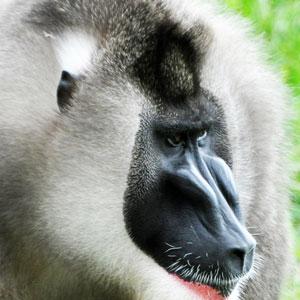當(dāng)前位置: Language Tips> VOA聽力> Normal Speed News VOA常速
分享到

Scientists are studying a rare African monkey that's endangered both from climate change and humans. They hope the primate's past can give clues to the future effects of rising temperatures.
It's called the Mandrillus leucophaeus, or drill for short, and lives in the equatorial rainforests of Nigeria, Equatorial Guinea and Cameroon. It's not the first time the drill has faced problems from climate change. University of Oregon Anthropology Professor Nelson Ting says about 3,000 to 5,000 years ago, there was a large decline in their population.
"Around this time period, you see a dramatic loss in forest coverage in this region that the drill inhabit. And the reason for the forest loss was because of similar conditions that are projected in these regions in the future. So a very warm climate in combination with an increased seasonality and an increased aridity," he said.
The vegetation changes and becomes sparser as temperatures rise and conditions get drier.

Ting is the lead author of the drill study that appeared in the journal Ecology and Evolution. "Knowing more about the natural history and ecology will definitely help designating conservation priorities for an animal that is really struggling with a lot of different pressures right now".
Conditions now appear similar to what happened 3,000 to 5,000 years ago. There's rainforest loss, rising temperatures and dryer weather. But back then, the Bantu people began migrating from the Nigeria/Cameroon area. They introduced agriculture and iron smelting as they migrated, which may have also contributed to forest loss. Whether the Bantu hunted the drill is unclear, but its meat is certainly prized today.
"The larger concern right now for the drill is not actually climate change. That certainly is a concern down the road. But probably hunting is actually the largest problem with the drill right now. If we can protect large areas of forest, that will lead to protection of habitat. If we can protect it effectively, we can protect the animal from hunting. And then we can also buffer any kind of future effects of climate change as well. That would be ideal."
Professor Ting says in science the key to the present and the future is often found in the past. Scientists say the history of the drill could help them understand what could lie in store for Africa's rainforests over the next 100 years.
Mandrillus leucophaeus: 一種鉆猴
sparser: 稀疏的;稀少的;貧乏不足的
Climate change blamed for dying African trees
Glimpsing the future on climate change
Warnings of Horn drought came early
Thousands march for climate action in Durban
(來(lái)源:VOA 編輯:Rosy)
分享到
關(guān)注和訂閱


口語(yǔ)
關(guān)于我們 | 聯(lián)系方式 | 招聘信息
電話:8610-84883645
傳真:8610-84883500
Email: languagetips@chinadaily.com.cn